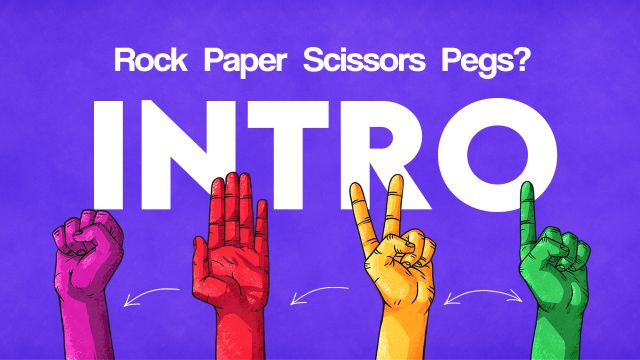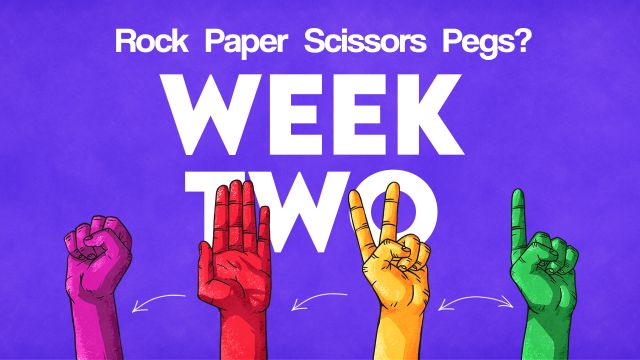Rock, Paper, Scissors, Pegs - Connect Groups
What Are Connect Groups?
What are Connect Groups?
‘Connect Groups’ is the name we give to small informal gatherings who decide to meet together to explore the Bible alongside our monthly themes. These groups are independent and folk can simply set up their own Connect Group themselves, meeting together with friends and family on their own basis. In this time of Lockdowns when people can’t get together physically this material can still be used to meet together online.
Each month we produce a range of questions to adapt our themes for group discussion. The material is offered as a starting point and there is no need to go through all the questions.You can pick and choose, tailoring it to suit the needs and interests of your group. Each ‘Part’ could form the basis of a weekly roughly 90 minute meeting but you could break it up differently. Let us know if you would like to find out more about Connect Groups and different ways of linking into the Sanctuary First community.
We all come to the Bible with our own questions, insights and barriers. The guiding principle we have in writing these is to ask questions we don’t already know the answer to! Our hope is to facilitate open-ended discussions. Often the most valuable parts of group chats are the bits that go off on bizarre tangents. And there’s nothing wrong with that. Jesus knows a thing or two about bizarre tangents…
Need some advice on starting your own Connect Group?
Get in touch.
Introduction
Introduction
 Rock, paper, scissors… pegs! This month we’re doing a case study on some key shapers of the early church. What can we learn from the rock Peter? What will we uncover from Paul’s papers? What gems glint in amongst the tantalising snippets? And who is Priscilla and why are we talking about pegs!?
Rock, paper, scissors… pegs! This month we’re doing a case study on some key shapers of the early church. What can we learn from the rock Peter? What will we uncover from Paul’s papers? What gems glint in amongst the tantalising snippets? And who is Priscilla and why are we talking about pegs!?
This month we begin a new theme trilogy. Over the last six months we have reflected on the breadth and scope of our faith over space. Now we want to zoom in and plant these insights in specific lived examples of faith. So we begin in May by looking at some of the significant shapers of the early church who got in — not so much at the ground floor but at the basement of this brand new movement! Christianity for them was not simply some abstract and fuzzy concept — it was a living and breathing thing they had to come to terms with physically, emotionally, and socially. It inspired, challenged, stretched and fuelled them through tempestuous fluctuating times. So we’re grounding our case studies in four everyday objects.
We have taken inspiration from the playground game rock-paper-scissors with its three interlocking components. Players of rock-paper-scissors must be quick on their feet adapting to the circumstances, like the first disciples. Rock, paper and scissors are ordinary objects too, things woven into the everyday act of existence, like the faith of the early church. Their faith wasn’t a mystical magical thing kept separate from the rest of their lives — it was right in the middle of their everyday living and the daily decisions they made.
Then there’s the tension and friction between the objects… like iron sharpening iron the creative tension between them ratchets up. Scissors beat paper, paper beats rock, rock beats scissors. Embedded in the game is a history of technology. A rock — essentially the most direct and basic of all tools. Paper an evolving shifting thing over time that has taken many forms from papyrus to parchment — a fundamentally simple object but labour intensive and time consuming to make. And then scissors — an advanced form of craftsmanship relying on a pyramid of multiple other technologies underneath it to work. Indeed even in New Testament times there would have been lots of rocks and versions of paper but no scissors in our machine-made modern sense. Some forms of shears but not the engineered scissors we know today. Scissors represent a complex point in human production capability. And yet even the sharpest edge of technology can be blunted by first principles — when it meets rock.
Human innovation in technology, or the arts, or in the church, is not a straightforward linear journey. It’s more of a spiral moving forwards but in rotations as we discover and rediscover old truths that spin us forward. We might paper over the rocks, and cut the paper to smithereens but then the blades hit a rock and we reevaluate. Rocks are still important just like the bedrock insights in wider culture.
And what about those pegs? There’s no pegs in the game, no alternative to the competition of rock/paper/scissors. But in the early church some tentmakers did see an alternative path — a way of making tents big enough to care for wider society while nurturing something new: God’s vision of who we could be. People forging a way of life outside the rat-race, going against the grain with grace. Living lightly, planting pegs in the soil and welcoming one and all.
So join us as we explore how the early church came together spurring one another on and supporting one another in the midst of their hectic and unsure lives. They were a collection of rocks, papers, scissors and pegs — much more than the sum of their parts.
Just like us.
SEEDS TO SOW: We have a 'Seeds to Sow' phrase at the beginning of each section. These are open-ended and optional and are designed for people wanting to develop their own ideas/resources in response to the material. Perhaps if using this material as a group you could use these prompts to inspire a time of prayer, or drawing, or creative writing? They are intended to be short and sweet, simply a starting off place for you and your imagination, be encouraged to tailor/develop as suits your group.
Download the Discussion Questions as a PDF
These discussion questions adapt our monthly themes for small Connect Groups or personal Bible study (look up the Rock, Paper, Scissors, Pegs PDF for more information on this month's theme). The questions are divided into 4 parts to correspond with the 4 weeks of the Daily Worship theme. They are offered as a guideline and there is no need to go through all the given questions in a single session, or in the following sequence. Feel free to pick and choose, or adapt to what interests you or your group.
Find how to get involved: Connect group Blog
Week One
‘Paper’ a case study on Paul
 Paul’s written legacy is one of the most influential in world history. What can we learn from this complex man who lived, breathed and wrote his way through the birth of an earth changing global movement? And in a wider sense, what does it mean to be God’s paper — to be a canvass communicating to the world around us?
Paul’s written legacy is one of the most influential in world history. What can we learn from this complex man who lived, breathed and wrote his way through the birth of an earth changing global movement? And in a wider sense, what does it mean to be God’s paper — to be a canvass communicating to the world around us?
SEEDS TO SOW: IMAGINE WRITING A LETTER ABOUT YOUR FAITH TO YOUR HOMETOWN. WHAT WOULD YOU WRITE? “TO ALL THE SAINTS OF...” *
Read Acts 17: 16-31
Here we see Paul the writer as Paul the observer and debater — taking time to walk around and absorb the culture around about him, engaging with it directly.
What do you think of Paul’s actions here? What can this scene tell us about Paul as a writer? And how could it inform how we engage with wider society?
Read 1 Corinthians 9: 19-23
Paul, to use a phrase from Marshall McLuan, is interested in the medium as well as the message — not just the content of what he says but how he says it. Paul communicates differently to different groups.
How does Paul (and by extension how can we) tailor how he talks to others about God while staying true to himself and God at the same time?
Read Romans 12: 9-21
Paul in his writing here is bit like a network engineer encouraging us to be routers of good connections and circuit breakers of evil.
We may not rely on paper as much as Paul but 21st century life is crammed full of writing in our era of instant communication. How can we be inspired by Paul’s words here to overcome evil with good in our daily acts of writing and living? What good connections could we make to continue chain reactions of grace?
* SEEDS TO SOW: These are open-ended and optional prompts and are designed for people wanting to develop their own resources in response to the themes. Perhaps if you are using this material as a group you could use these prompts to inspire a time of prayer, or drawing, or creative writing? They are a short and sweet, simply a starting off place for you and your imagination. Tailor and develop as suits your group.
Week Two
‘Pegs’ A Priscilla Case Study
 Without pegs a tent is just a very large kite. The early church had many pegs who while able to look up to the heavens but could also hold firm to the ground they were set in. This week we turn to such a figure: Priscilla, a tentmaker, literally and figuratively, who was a shaper of the early church.
Without pegs a tent is just a very large kite. The early church had many pegs who while able to look up to the heavens but could also hold firm to the ground they were set in. This week we turn to such a figure: Priscilla, a tentmaker, literally and figuratively, who was a shaper of the early church.
SEEDS TO SOW: WHAT KEEPS A PEG IN THE GROUND & WHAT KEEPS US GROUNDED? *
Read Acts 18: 1-3
We begin this week by thinking about both literal and metaphorical tent making. Paul, Aquila and Priscilla, — tentmakers by trade — were all people out of place finding a new way of being.
Do you think the work of making tents helped inspire them in the metaphorical tent making of forming new communities in the Jesus movement? If so, how?
And how can we be tentmakers in our communities? People creating space for others to gather together and shelter under?
Read Acts 18: 24-28
Priscilla and Aquila helped Apollos to understand the way of God more accurately. To keep our peg imagery going they helped this enthusiastic square peg to fit!
How can we follow their example and compassionately and sensitively help guide others in life and faith? And how can we be humble and self-aware in our own lives, willing to accept help from grounding pegs like Priscilla and Aquila?
Read 1 Corinthians 16: 19
A very short fragment here giving us another glimpse of Priscilla. You’ve heard of pillars of the community, well what about pegs of the community? Priscilla was one. Pegs, less showy than pillars perhaps, but vitally important for keeping things together. A tent without pegs after all is just a big kite...
There quite a few greetings being passed on like this in the New Testament, a crisscross of communication — pegs to hold in place this fledgling new community. How must it have felt before modern technology to hear these ‘shout-outs’ every so often?
Who would you say are the pegs in our communities — the people who quietly hold things together?
* SEEDS TO SOW: These are open-ended and optional prompts and are designed for people wanting to develop their own resources in response to the themes. Perhaps if you are using this material as a group you could use these prompts to inspire a time of prayer, or drawing, or creative writing? They are a short and sweet, simply a starting off place for you and your imagination. Tailor and develop as suits your group.
Week Three
‘Snippets’ An Early Church Shapers Case Study
 So back to rock, paper, scissors — and we’ll use those scissors to look for the snippets, the little tantalising glimpses we get of some of the many souls who shaped the early church. Many are drawn from the remarkable sequence in Romans 16.
So back to rock, paper, scissors — and we’ll use those scissors to look for the snippets, the little tantalising glimpses we get of some of the many souls who shaped the early church. Many are drawn from the remarkable sequence in Romans 16.
SEEDS TO SOW: WHAT ARE WE SEWING AND MENDING IN OUR LIVES? *
Read 2 Timothy 1: 3-7
We begin with a snippet about Lois and Eunice, and by reflecting on how faith is shaped generationally — directly and indirectly — by parents, grandparents and all the ‘alloparents’ who raise us.
How do you think Timothy would have felt about this reference to his mother and grandmother right at the start of the letter?
Read Acts 9: 36-42
Here we get a tantalising snippet of Tabitha’s life, but what did she go on to do next? As we’re thinking about scissors and snippets this week we are mindful of her role as someone who made clothes, is this something she carried on doing do you think? What might it have been like for someone making clothes in that day and age?
Take some time to imagine snippets of the rest of her life after the events of this day, perhaps telling her nieces and nephews about it. Also take time to recall stories about different snippets of your life where people have come in and out and had a profound influence on you.
Read Romans 16
Here we see so many snippets of so many lives. It can be easy to think about people from the early church like Paul as isolated figures... but they weren’t. They were products of a vibrant community of saints living and striving together. Just like us.
There are so many fascinating glimpses here. Like Phoebe having Paul as a reference for her CV! Or the outstanding Andonicus and Junia, or Rufus’s mother who was like a mother to Paul too!
How does reading this sequence make you feel? And what does it tell you about the early church?
* SEEDS TO SOW: These are open-ended and optional prompts and are designed for people wanting to develop their own resources in response to the themes. Perhaps if you are using this material as a group you could use these prompts to inspire a time of prayer, or drawing, or creative writing? They are a short and sweet, simply a starting off place for you and your imagination. Tailor and develop as suits your group.
Week Four
‘Rock’ A Peter Case Study
 It’s Pentecost, we have explored paper, scissors and pegs and now it’s time to rock on with Peter! The big man, one of the most vivid protagonists of our faith, beloved for his flaws as much as his strengths. A true rock of the early church but one that could crumble, a man of great faith and great doubt. An unstoppable force that met the immovable object of God’s love. This week we build a cairn out of the rocky fragments of this vital, vigorous life and see how it can help mark the way for us.
It’s Pentecost, we have explored paper, scissors and pegs and now it’s time to rock on with Peter! The big man, one of the most vivid protagonists of our faith, beloved for his flaws as much as his strengths. A true rock of the early church but one that could crumble, a man of great faith and great doubt. An unstoppable force that met the immovable object of God’s love. This week we build a cairn out of the rocky fragments of this vital, vigorous life and see how it can help mark the way for us.
SEEDS TO SOW: MAKE A SMALL PRAYER CAIRN *
Read Acts 2: 1-21 (and 22-42 if you have time and your group is up for it!)
It’s a rocky moment, totally unprecedented, no one is sure what happens next. And then the big man gets up to speak...
What stands out to you about this scene? Especially about Peter and his actions throughout? What moments or details interest or puzzle you?
Read John 21: 15-19
Now we go back in time and stand with Jesus and Peter on the rocky beach. What can we learn from this scene for our lives of discipleship today? Can we take some little insights — some little rocks — from this shoreline to build a little cairn to help the mark the way for our own journey?
Read Acts 10: 1-33 (and 34-48 if you have got time and your group is up for it!)
Flipping forward, back to Acts, we find the rocky road Cornelius took to Peter, that Peter took to Cornelius, and that both of them took to new understanding.
What do you think of the various steps both men took on this new rocky ground they found themselves in? What do you make of how they responded to their visions and what they did next?
* SEEDS TO SOW: These are open-ended and optional prompts and are designed for people wanting to develop their own resources in response to the themes. Perhaps if you are using this material as a group you could use these prompts to inspire a time of prayer, or drawing, or creative writing? They are a short and sweet, simply a starting off place for you and your imagination. Tailor and develop as suits your group.









